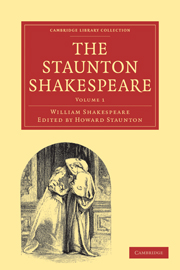Book contents
- Frontmatter
- Contents
- PREFACE
- SOME ACCOUNT OR THE LIFE OF SHAKESPEARE
- SHAKESPEARE'S WILL
- PRELIMINARY MATTER IN THE FOLIO OF 1623
- THE ADDRESS TO THE READER
- COMMENDATORY VERSES
- ADDENDA AND CORRIGENDA
- THE TWO GENTLEMEN OF VERONA
- LOVE'S LABOUR'S LOST
- THE COMEDY OF ERRORS
- ROMEO AND JULIET
- THE TAMING OF THE SHREW
- KING JOHN
- A MIDSUMMER NIGHT'S DREAM
- THE MERCHANT OF VENICE
- KING RICHARD THE SECOND
- THE FIRST PART OF KING HENRY THE FOURTH
- THE SECOND PART OF KING HENRY THE FOURTH
- THE MERRY WIVES OF WINDSOR
- MUCH ADO ABOUT NOTHING
THE COMEDY OF ERRORS
Published online by Cambridge University Press: 29 August 2010
- Frontmatter
- Contents
- PREFACE
- SOME ACCOUNT OR THE LIFE OF SHAKESPEARE
- SHAKESPEARE'S WILL
- PRELIMINARY MATTER IN THE FOLIO OF 1623
- THE ADDRESS TO THE READER
- COMMENDATORY VERSES
- ADDENDA AND CORRIGENDA
- THE TWO GENTLEMEN OF VERONA
- LOVE'S LABOUR'S LOST
- THE COMEDY OF ERRORS
- ROMEO AND JULIET
- THE TAMING OF THE SHREW
- KING JOHN
- A MIDSUMMER NIGHT'S DREAM
- THE MERCHANT OF VENICE
- KING RICHARD THE SECOND
- THE FIRST PART OF KING HENRY THE FOURTH
- THE SECOND PART OF KING HENRY THE FOURTH
- THE MERRY WIVES OF WINDSOR
- MUCH ADO ABOUT NOTHING
Summary
“The Comedie of Errors” is one of those plays no copy of which has been discovered prior to that in the folio of 1623. It is noticed by Meres, (Palladis Tamia, 1598,) and, in all probability, was written, and acted first, in the very dawn of Shakespeare's genius. The main incident appears to have been taken from the Mencechmi of Plautus, but whether directly, or through the medium of some early translation of the Roman comedy, will most likely remain a subject of interesting speculation to editors and commentators for ages yet unborn.
Steevens conceived that our author was indebted to an English version by W. W[arner], printed in 1595, but there are circumstances which militate strongly against this presumption. In the first place, we have almost decisive proof that the present play was publicly performed a year before Warner's Mencechmi appeared, since in the Gesta Grrayorum of 1594 (published in 4to, 1688) is the following entry :— “After such sports, a Comedy of Errors (like to Plautus his Menechmus) was played by the players; so that night was begun and continued to the end, in nothing but confusion and errors; whereupon it was ever afterwards called the Night of Errors.” (P. 22.) Again, it is reasonable to expect, if Shakespeare had adopted Warner's version for the groundwork of his play, that some coincidence in the names of the characters, or at least some parallelism in the ideas and turns of expression, would be evident in the two works; but none has been detected.
- Type
- Chapter
- Information
- The Staunton Shakespeare , pp. 109 - 152Publisher: Cambridge University PressPrint publication year: 2009First published in: 1858

